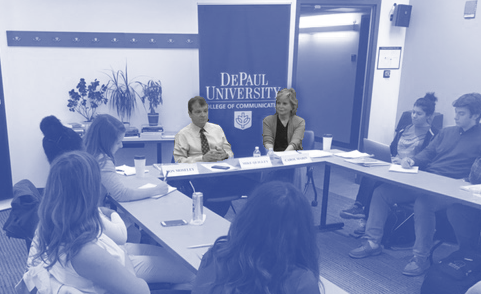This week, Rep. Mike Quigley (D-5th) visited students from DePaul’s journalism program to discuss transparency, media and government relations and the discourse of so-called “fake news.” Quigley, a multi-term congressman in a district that spans from Lakeview to Hinsdale, sits on the House Intelligence and Appropriations committees and co-created the House Transparency Caucus in 2010. He’s also been openly critical of President Donald Trump, particularly related to issues surrounding the Russia investigation.
“There’s a lot to say, but I think it’s important to know how historic this is and how important the press has become,” he said.
Here are the top four takeaways from Quigley’s talk.
On “fake news”
In discussing the term “fake news” — originally meant to describe misinformation presenting itself as journalism — Quigley expressed a sense of reservation, saying that it has a mutable meaning. “The big trap is that if they disagree with you, they just say, ‘Oh, that’s fake news,’” he said. Still, he maintains that for the time being, the phrase is the easiest way of communicating what he views as a complex idea.
“Sometimes you get lost in this discussion, but it’s a term that the public understands,” he said. “And maybe we need to take it out. I guess we haven’t all learned how to communicate in the world, and how to express ourselves effectively. It’s much different than it was just a couple years ago.”
On understanding the other side of politics
Quigley acknowledged the difficulties of facing ideas he disagrees with — particularly in an increasingly polarized political environment — but says he wants to “change people’s minds” on complicated issues related to the environment and gun control. He added he believes both journalists and politicians have to work to grasp the other side of the arguments surrounding their discussions.
“I see people on the Hill watching Trump’s conversations and mocking them — I want to understand why 70 percent of the population watches that,” he said. “Sometimes there’s not two sides to the story, but you still have to understand the motivation. Right, if one side said the world is flat, you know it’s nonsense, but you sort of have that argument in some of the issues today.”
On whistleblowers
He’s no Edward Snowden fan (“He made our troops less safe and cost us billions of dollars”), but Quigley says he’s “always striving for a very vibrant and helpful whistleblower protection plan.”
“I’ve spent over three years now getting briefed on our nation’s most important secrets,” he said. “I completely believe in a free press, and I believe it’s important to have whistleblowers.”
On leaking information to the media
Following a torrent of leaks during President Trump’s first year in office, Attorney General Jeff Sessions announced that “the culture of leaks must stop.” For his part, Quigley acknowledges there’s not always a black and white line for what’s right and wrong to leak, and both journalists and politicians will continue to struggle with the ethical issues around those exposures.
“Why do electeds leaks, generally? [To] curry favor. They think the news needs to get out. It’s tough because during the Russian investigation — and I’ve never said this publicly — I would have reporters who have done a masterful job, and they’re right on the doorstep, and I can’t help them. It’s so tempting, because they’re doing something really important.”
Header image by Cody Corrall




NO COMMENT